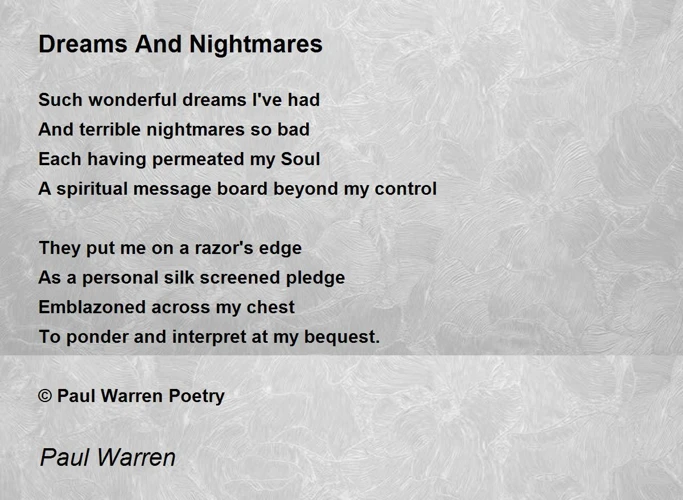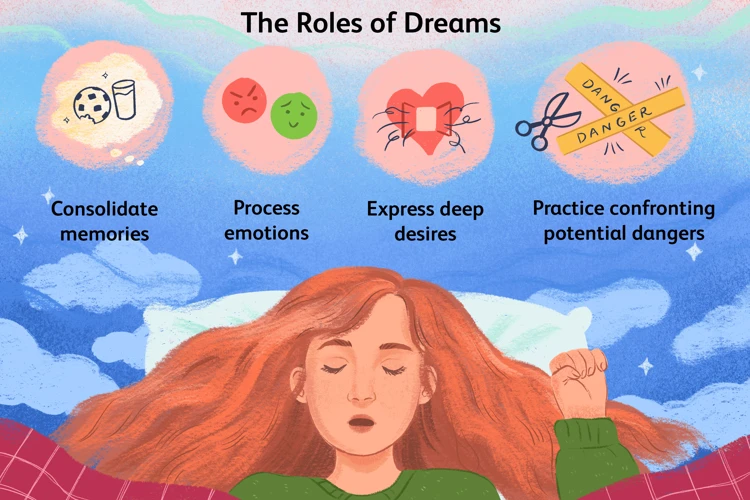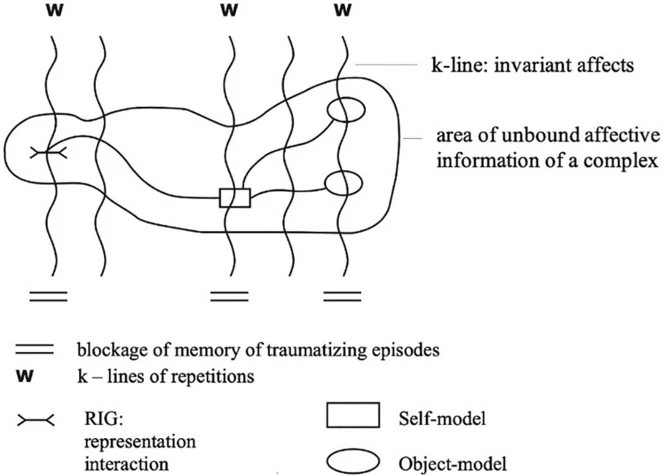Unraveling the Link Between Nightmares and Unresolved Trauma: Understanding the Deep Connection
Nightmares can be terrifying and distressing, leaving us in a state of unease long after we wake. But have you ever wondered why certain nightmares seem to recur? Could there be a hidden link between these unsettling dreams and unresolved trauma buried deep within our psyches? In this article, we embark on a journey to explore the intricate connection between nightmares and unresolved trauma. We delve into the nature of nightmares, gain insights into unresolved trauma and its effects, and uncover the profound connection that exists between the two. Join us as we unravel the enigma of how our dreams can give voice to our past traumas and provide crucial clues for our healing and recovery.
The Nature of Nightmares

Nightmares, with their vivid and often disturbing content, have intrigued humanity for centuries. The nature of nightmares remains a complex and enigmatic subject. While sleep is typically associated with rest and rejuvenation, nightmares can turn this peaceful state into a battleground of fear and anxiety. These intense dreams often involve threatening or distressing situations, evoking powerful emotions that can linger even after waking. Nightmares have a distinct quality of being more vivid, emotionally charged, and memorable than regular dreams. They frequently feature common nightmare symbols, such as falling, being chased, or experiencing a sense of being trapped. The meanings behind these symbols can vary, but they often reflect deep-seated fears or anxieties that we may not be fully aware of. Exploring recurring nightmares can provide valuable insights into our innermost fears and unresolved issues that are begging for our attention. Understanding the nature of nightmares is a crucial step in uncovering the hidden messages they hold and their potential link to unresolved trauma.
Understanding Unresolved Trauma

Unresolved trauma refers to past experiences of distressing or traumatic events that continue to have a profound impact on an individual’s mental and emotional well-being. Trauma can arise from various sources, including physical or emotional abuse, accidents, natural disasters, or witnessing violence. Examples of unresolved trauma can range from childhood neglect to experiences of war. The effects of unresolved trauma can be far-reaching, manifesting in symptoms such as anxiety, depression, hypervigilance, and difficulty trusting others. Individuals with unresolved trauma may find it challenging to form healthy relationships and may experience intense emotional reactions to triggering situations. Unresolved trauma can also manifest through recurring nightmares, a common symptom in traumatic stress disorders. To fully understand the impact of unresolved trauma, it is crucial to recognize its diverse causes and the significant toll it takes on an individual’s mental and emotional well-being. By exploring the deep-seated roots of trauma, we can begin to pave the path towards healing and recovery.
Definition and Examples
Definition and Examples:
To understand the connection between nightmares and unresolved trauma, we must first define what nightmares are. Nightmares are intense and distressing dreams that occur during REM (rapid eye movement) sleep, which is the phase of sleep associated with vivid dreaming. Unlike regular dreams, nightmares evoke strong negative emotions such as fear, terror, or anxiety. These emotions can be so overwhelming that they often lead to abrupt awakenings, leaving the dreamer feeling shaken and unsettled.
Nightmares can take on various forms and themes, depending on the individual and their unique experiences. Some common examples include:
1. Being chased: This is a recurring theme in nightmares, where the dreamer finds themselves pursued by an unknown entity or a menacing figure. The sense of fear and helplessness is often amplified, as the dreamer feels the imminent threat closing in on them.
2. Falling: Falling nightmares involve the sensation of plummeting from a height without control, often accompanied by a surge of panic. These dreams may reflect a sense of instability or a fear of losing control in waking life.
3. Losing loved ones: Nightmares that involve the loss of loved ones can be emotionally devastating. The dreamer may witness the death or disappearance of someone close to them, leaving them with deep-seated feelings of grief, fear, or powerlessness.
4. Being trapped: The nightmare trap is a common motif where the dreamer feels trapped, unable to escape from a threatening situation. This can manifest as being confined in a small space, tangled in a web, or facing an unseen danger lurking just beyond reach. (To learn more about the meaning of nightmare traps, check out our article on the subject.)
These are just a few examples of the myriad nightmares that individuals may experience. The themes and symbols within nightmares are highly personal and can vary greatly from person to person. Understanding the definition and examples of nightmares helps us recognize their distinct characteristics and sets the stage for exploring their connection to unresolved trauma. (To delve deeper into the common nightmare symbols, refer to our informative guide.)
Effects on Mental and Emotional Well-being
The effects of nightmares on mental and emotional well-being can be profound and far-reaching. When we experience nightmares, particularly those connected to unresolved trauma, it can have a significant impact on our overall psychological health. Persistent nightmares can cause increased levels of anxiety, fear, and distress, leading to disrupted sleep patterns and even insomnia. The vivid and disturbing nature of nightmares can evoke intense emotions, leaving individuals feeling drained and overwhelmed upon waking. These negative emotions can persist throughout the day, affecting mood, concentration, and overall functioning. The fear of experiencing another nightmare can create a sense of dread and anticipation, further exacerbating anxiety and stress levels. Nightmares can also trigger traumatic memories, intensifying the emotional impact and making it difficult to process and move forward. Exploring the meanings behind common nightmare symbols and delving into the intricacies of recurring nightmares can offer valuable insights into the underlying trauma and its impact on mental and emotional well-being. By understanding these effects, individuals can seek appropriate support and interventions to address and heal from unresolved trauma, fostering better mental and emotional health in the process.
Causes of Unresolved Trauma
Causes of unresolved trauma are varied and can stem from a range of experiences and circumstances. One common cause is experiencing a significant and traumatic event, such as physical or sexual abuse, a natural disaster, or a car accident. These types of events can leave deep emotional wounds that may take time and effort to heal. Childhood trauma, including neglect, emotional abuse, or witnessing domestic violence, can also contribute to unresolved trauma that persists into adulthood. Additionally, ongoing or repeated exposure to traumatic situations, such as living in a war zone or being in an abusive relationship, can leave individuals with unresolved trauma. Other factors that can contribute to unresolved trauma include a lack of social support, ineffective coping mechanisms, and feelings of powerlessness or helplessness. It’s important to recognize that each person’s experience and response to trauma is unique, and what may cause unresolved trauma in one individual may not have the same effect on another. Understanding the causes of unresolved trauma is vital in order to address and effectively heal these deep emotional wounds.
The Link Between Nightmares and Unresolved Trauma

The link between nightmares and unresolved trauma is a profound and intricate connection that extends deep into our subconscious. Nightmares often serve as a pathway to our unconscious mind, where unresolved trauma can manifest itself in various ways. Recurrent themes in nightmares, such as reliving traumatic events, facing fears, or being trapped in a nightmare trap, can be powerful indicators of unresolved trauma. These nightmares act as emotional triggers that reignite traumatic memories, causing intense distress and fear. For those who have experienced trauma, nightmares can become a frequent occurrence, disrupting sleep and exacerbating the symptoms of post-traumatic stress disorder (PTSD). Exploring the connection between nightmares and unresolved trauma offers a glimpse into the depths of our psyche and provides an opportunity for healing and recovery. Understanding the link between these two phenomena is crucial in unearthing the underlying causes and seeking appropriate treatment to restore emotional well-being.
Recurrent Themes in Nightmares
Recurrent themes in nightmares offer valuable insights into the hidden landscape of our subconscious minds. These themes can vary widely, but certain patterns often emerge. One common theme is that of being chased, representing a sense of fear or anxiety that is pursuing us relentlessly. Another recurring theme is falling, which may symbolize a loss of control or a fear of failure. Being trapped in a confined space is yet another prevalent motif, reflecting a feeling of being restricted or powerless. Other frequent themes include being attacked or harmed by unknown forces, losing loved ones, or experiencing public humiliation. These recurrent themes in nightmares often stem from our deepest fears and unresolved emotions. They serve as symbolic representations of our inner struggles and can be interpreted as messages from our subconscious minds. Exploring the meanings behind these recurring nightmares can lead us closer to understanding the root causes of our unresolved trauma and provide us with an opportunity for healing. To learn more about common nightmare symbols and the meaning behind the nightmare trap, you can refer to the relevant resources provided above.
Emotional Triggers and Traumatic Memories
Emotional triggers and traumatic memories play a significant role in the connection between nightmares and unresolved trauma. Nightmares can serve as a powerful portal to access and confront deeply buried emotional wounds. When unresolved trauma exists, certain triggers can activate these traumatic memories during sleep, resulting in nightmares. These triggers can vary from person to person and can include situations, objects, or even specific sounds that remind the individual of their traumatic experience. It is important to note that these triggers are unique to each individual and can stem from a wide range of traumatic events, such as accidents, physical or emotional abuse, or witnessing violence. The emotional intensity of these traumatic memories often becomes intensified in nightmares, evoking feelings of fear, helplessness, and distress. Through exploring recurring nightmares, individuals may uncover the hidden meanings behind their emotional triggers and gain a deeper understanding of the unresolved trauma that is still affecting them. By addressing and processing these traumatic memories, healing and recovery can begin. Understanding the emotional triggers and traumatic memories at play in nightmares is essential in unraveling the link between nightmares and unresolved trauma.
Connection to Sleep Disorders and Post-Traumatic Stress Disorder (PTSD)
The connection between nightmares and sleep disorders, as well as post-traumatic stress disorder (PTSD), is profound and multifaceted. Sleep disorders, such as insomnia or frequent disruptions in sleep patterns, are common among individuals who have experienced unresolved trauma. Nightmares often play a significant role in these sleep disturbances. The distressing content of nightmares can disrupt normal sleep cycles, leading to fragmented and restless sleep. This, in turn, exacerbates the symptoms of sleep disorders, creating a vicious cycle of sleep disturbance and nightmares.
Nightmares are a hallmark symptom of post-traumatic stress disorder (PTSD), a debilitating condition that can arise following a traumatic event. Individuals with PTSD experience recurring nightmares that consistently revisit the traumatic event, reawakening the intense emotions associated with the trauma. These nightmares serve as relentless reminders of the unresolved trauma and can significantly impact an individual’s overall emotional well-being and quality of life.
The relationship between nightmares and PTSD is bidirectional. While nightmares can be a symptom of PTSD, they can also perpetuate and intensify the disorder. The distress caused by nightmares can lead to sleep avoidance, anxiety surrounding sleep, and an increased arousal response, heightening the individual’s hypervigilance and overall distress associated with the trauma.
Understanding the connection between nightmares, sleep disorders, and PTSD is crucial in devising effective treatment strategies. By addressing sleep disturbances and finding ways to manage and reduce the frequency and intensity of nightmares, individuals can gain relief from the distressing symptoms associated with PTSD. Exploring therapy options, such as Cognitive Behavioral Therapy for Insomnia (CBT-I) or exposure-based therapies, can be beneficial in breaking the cycle of sleep disruption and trauma-related nightmares.
It is important to remember that each individual’s experience with nightmares, sleep disorders, and PTSD is unique. Seeking professional help and support is essential in navigating and addressing the complex interplay between these issues, allowing individuals to regain control over their sleep and emotional well-being.
Healing and Resolving Trauma-related Nightmares

Healing and Resolving Trauma-related Nightmares
Healing and resolving trauma-related nightmares is a vital component of the recovery process. Psychotherapy and counseling play a crucial role in providing support and guidance to individuals struggling with unresolved trauma. Therapists employ various techniques, such as cognitive-behavioral therapy (CBT) and eye movement desensitization and reprocessing (EMDR), to help individuals process and integrate their traumatic experiences. Exploring trauma through dreams can also be a powerful tool for healing. By keeping a dream journal and discussing dream themes in therapy sessions, individuals can gain valuable insights into their subconscious and uncover hidden meanings behind their nightmares. Additionally, practicing self-care and stress reduction techniques, such as mindfulness, meditation, and exercise, can alleviate symptoms associated with trauma-related nightmares. Alternative therapies, such as art therapy or hypnotherapy, may also be beneficial in facilitating trauma recovery. It is important to remember that healing from trauma takes time and patience, and each individual’s journey is unique. With proper support and the adoption of various healing modalities, individuals can regain control over their nightmares and work towards resolving their unresolved trauma.
Psychotherapy and Counseling
Psychotherapy and counseling are essential tools in healing and resolving trauma-related nightmares. This form of treatment provides a safe and supportive environment in which individuals can explore and process their unresolved trauma. Upon seeking professional help, individuals can work with trained therapists who specialize in trauma and dream analysis. Psychotherapy approaches such as cognitive-behavioral therapy (CBT), eye movement desensitization and reprocessing (EMDR), and psychodynamic therapy are often used to address the underlying trauma that contributes to nightmares. With the guidance of a therapist, individuals can develop coping mechanisms to manage the distressing emotions associated with nightmares. Through psychotherapy, individuals can also gain insight into the possible connections between their nightmares and specific traumatic experiences. The therapist may help identify common themes or symbols in the nightmares, such as recurring nightmare traps, which can shed light on deeper unresolved issues. Ultimately, the goal of psychotherapy and counseling is to empower individuals to process and heal from their trauma, leading to a reduction in nightmares and an improvement in overall mental well-being. utilizing-alternative-therapies
Exploring Trauma through Dreams
Exploring trauma through dreams offers a unique and insightful way to understand and process unresolved traumatic experiences. Dreams have long been recognized as a window into the subconscious mind, where suppressed emotions and memories can surface. When it comes to trauma, dreams can serve as a powerful tool for exploring and unraveling the deep-seated wounds that remain hidden in our waking lives. Dream symbols and imagery can provide clues about the nature of the trauma and its impact on our mental and emotional well-being. By paying attention to recurring themes or patterns in our dreams, we can begin to decipher the meaning behind them and gain a deeper understanding of our unresolved trauma. It is important to approach this exploration with support, whether through therapy or self-reflection, as delving into traumatic experiences can be emotionally challenging. However, by using dreams as a guide, we can embark on a transformative journey towards healing and recovery.
Practicing Self-care and Stress Reduction Techniques
Practicing self-care and stress reduction techniques can play a vital role in healing and resolving trauma-related nightmares. Trauma can take a toll on our mental and emotional well-being, making it crucial to prioritize self-care as we embark on the journey of recovery. Engaging in activities that promote relaxation and reduce stress can help create a more conducive sleep environment and minimize the occurrence of nightmares. Regular exercise, such as yoga or meditation, can be particularly effective in reducing anxiety and promoting a state of calm. Taking time for oneself, engaging in hobbies or creative outlets, and maintaining a balanced lifestyle can also contribute to overall well-being and better sleep quality. It is important to establish healthy sleep hygiene practices, including maintaining a consistent sleep schedule and creating a soothing bedtime routine. Additionally, relaxation techniques like deep breathing exercises or progressive muscle relaxation can be employed to calm the mind and body before sleep, reducing the likelihood of nightmares. By integrating self-care and stress reduction techniques into our daily lives, we can create a foundation of resilience and inner peace, allowing us to navigate the challenges of trauma recovery and find solace in restful and nightmare-free nights.
Utilizing Alternative Therapies
Utilizing Alternative Therapies
In addition to traditional psychotherapy and counseling, alternative therapies have emerged as valuable tools in healing trauma-related nightmares. These therapies offer unique approaches that can complement and enhance the healing process. One such therapy is Eye Movement Desensitization and Reprocessing (EMDR), which has shown promising results in treating nightmares associated with post-traumatic stress disorder (PTSD). EMDR involves using bilateral stimulation, such as eye movements or tapping, to help individuals process traumatic memories and reduce the distress associated with them. Another alternative therapy is art therapy, which allows individuals to express their emotions and experiences through artistic expression. This creative outlet can be particularly beneficial for those who struggle with verbalizing their trauma. Mindfulness practices, such as meditation and yoga, can also be effective in calming the mind and reducing the frequency and intensity of nightmares. These practices promote relaxation, self-awareness, and stress reduction, which can help individuals regain a sense of control over their dreams and sleep patterns. Utilizing alternative therapies provides a holistic approach to healing trauma-related nightmares and empowers individuals to explore different avenues for recovery.
Empowering Individuals with Tools for Recovery
Empowering individuals with the necessary tools for recovery is crucial in addressing the link between nightmares and unresolved trauma. Psychotherapy and counseling play a significant role in helping individuals navigate the path to healing. Through specialized therapy techniques, such as cognitive-behavioral therapy (CBT) or eye movement desensitization and reprocessing (EMDR), individuals can work through traumatic experiences and develop healthier coping mechanisms for managing nightmares. Additionally, exploring trauma through dreams can be a powerful tool for gaining insights and processing unresolved emotions. Journaling, dream analysis, and discussing dreams with a therapist can provide a safe space for self-reflection and self-discovery. Practicing self-care and stress reduction techniques also play an integral part in recovery. This may include activities such as mindfulness meditation, engaging in creative outlets, adopting a regular sleep routine, and engaging in regular exercise. Utilizing alternative therapies like acupuncture or art therapy can complement traditional approaches and provide additional support on the journey to healing. By empowering individuals with a comprehensive toolkit encompassing therapy, self-care, and alternative therapies, we can help those affected by unresolved trauma find solace, peace, and ultimately a brighter future.
Conclusion
In conclusion, the intricate link between nightmares and unresolved trauma cannot be ignored. Nightmares, with their powerful imagery and emotional intensity, often serve as a window into our past traumas and unresolved issues. By examining recurring nightmares, exploring their meanings, and delving into the underlying emotions they bring forth, we can begin to unravel the unresolved trauma that continues to haunt us. Seeking professional help through psychotherapy and counseling can provide valuable guidance and support on the journey towards healing and recovery. Additionally, incorporating self-care practices and stress reduction techniques into our daily lives can enhance our overall well-being and aid in managing the distressing effects of nightmares. The exploration of alternative therapies, such as art therapy or EMDR, can also offer unique approaches to processing and resolving trauma-related nightmares. By empowering ourselves with these tools and resources, we can take important steps towards healing, finding peace, and reclaiming our nights from the grip of unresolved trauma.
Frequently Asked Questions
1. Can nightmares be a sign of unresolved trauma?
Yes, nightmares can indeed be a manifestation of unresolved trauma. They often serve as a way for the subconscious mind to process and express deeply rooted emotions and experiences that have not been fully resolved or healed.
2. Are all nightmares related to unresolved trauma?
No, not all nightmares are directly linked to unresolved trauma. Nightmares can have various causes, including anxiety, stress, medication, or even certain foods. However, unresolved trauma can be a significant factor in recurring or highly vivid nightmares.
3. How can nightmares help us uncover unresolved trauma?
Nightmares can provide valuable clues about unresolved trauma by presenting recurring themes, symbols, or unsettling emotions. By carefully exploring and interpreting these elements, individuals can gain insights into the underlying trauma and begin the healing process.
4. Are there common symbols in nightmares that relate to unresolved trauma?
Yes, certain symbols tend to appear frequently in nightmares related to unresolved trauma. These symbols may include being trapped or immobilized, feeling helpless or chased, experiencing physical pain or violence, or encountering people or places connected to the traumatic event.
5. Can unresolved trauma lead to sleep disorders?
Yes, unresolved trauma can contribute to the development of sleep disorders, such as insomnia or nightmares. The distressing memories and emotions associated with the trauma can disrupt normal sleep patterns and lead to difficulties in falling asleep or staying asleep.
6. What role do emotions play in trauma-related nightmares?
Emotions play a significant role in trauma-related nightmares. Nightmares can evoke intense emotions like fear, anxiety, sadness, or anger, mirroring the emotional experiences associated with the unresolved trauma. This emotional intensity can contribute to the distress caused by these dreams.
7. Can therapy help in resolving trauma-related nightmares?
Yes, therapy and counseling can be highly beneficial in resolving trauma-related nightmares. Therapists can help individuals explore and process their trauma, develop coping strategies, and work towards healing and recovery, ultimately reducing the frequency and intensity of nightmares.
8. Can practicing self-care and stress reduction techniques alleviate trauma-related nightmares?
Absolutely, practicing self-care and stress reduction techniques can be instrumental in alleviating trauma-related nightmares. Engaging in activities like exercise, meditation, journaling, and maintaining a healthy lifestyle can help regulate emotions, reduce overall stress levels, and promote better sleep.
9. What alternative therapies can be useful for healing trauma-related nightmares?
Alternative therapies such as eye movement desensitization and reprocessing (EMDR), yoga, art therapy, or hypnotherapy can be effective in healing trauma-related nightmares. These therapies provide additional tools and techniques for individuals to process and integrate their traumatic experiences.
10. Can individuals recover from trauma-related nightmares?
Yes, individuals can indeed recover from trauma-related nightmares. With the right support, therapy, and self-care practices, it is possible to heal from unresolved trauma, reduce the frequency and intensity of nightmares, and regain a sense of peace and well-being.








